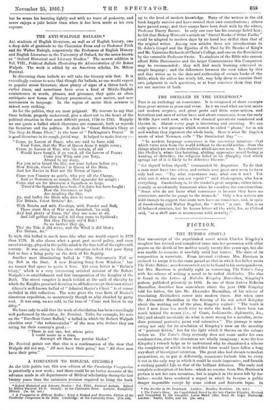ILO, ANTI-WALPOLE BALLADS.* ALL students of English literature, as well
as of English history, owe a deep debt of gratitude to the Clarendon Press and to Professor Firth and Sir Walter Raleigh, respectively the Professors of English History and English Literature in the University of Oxford, for the series known as " Oxford Historical and Literary Studies." The newest addition is Vol. VIII., Political Balladu Illustrating Me Administration of Sir Robert Walpole. The work is edited by an American scholar, Dr. Milton Percival.
In discussing these ballads we will take the literary side first. It is exceedingly curious to note that though the ballads, as one would expect in popular street literature, show plenty of signs of a throw-back to earlier times, and sometimes have even a kind of Middle-English reminiscence in words, phrases, and grammar, they quite as often anticipate new forma of literary presentation, new metres, and new movements in language. In the region of metre their newness is indeed very striking.
As for the politics, they are most poignant. We venture to say that these ballads, properly understood, give a short-out to the heart of the political situation in that most difficult period, 1720 to 1745. Happily we can quote a ballad which illustrates our comment, both as regards the literature and the politics. It shall be " Great Britain's Glory or The Stay-At-Home Fleet," to the tune of " Packington's Pound." It is good literature in its rough, jovial way. It helped-to make history :— " Come, yo Lovers of Peace, who are said to have sold Your Votes, that the War of Queen Anne it might cease ; Come, ye Lovers of War, who 'tic certain, of old Would have hang'd, if ye cou'd, all the Lovers of Peaoe: Come you Whig and you Tory, Attend to my story,
For you ne'er heard the like, nor your fathers before ye ; How Britain, Great Britain ! is Queen of the Main, And her Navies in Port are the Terror of Spain. Come you Country so gentle, who pay all the Charge,
And ye Statesmen so simple, that squander for nought : Come and see for Diversion a Squadron so large, 'Twou'd the Spaniards have beat, if it durst but have fought : How the Streamers so high Are insulting the Sky, Ay, and buffet the Birds who dare to come nigh : For Britain, Great Britain ! &c.
With Bombs and with Fireships, with Powder and Ball, These stout Men of War were furnished, 'tis said, And had plenty of Guns, tho' they use none at all, And full gallant they sail'd, till they came to Spithead But then Fl(eur)y cry'd Boh !
So no farther they go, Tho' the Tide it did serve, and the Wind it did blow ; For Britain, &e."
In style this ballad is much more like what one would expect in 1779 than 1729. It also shows what a great part naval policy, and even naval strategy, played in the public mind in the first half of the eighteenth century. It was owing to this close attention indeed that poor Byng had to face a firing party on the deck of his flagship.
Another most illuminating ballad is " The Statesman's Fall or Sir Bob in the Dust. A new Hunting Song from Windsor," but we cannot find space to quote it here. Yet even better is " Robin's Glory," which is a very interesting satirical account of Sir Robert Walpole's re-establishment and first inauguration of the Knights of the Bath. The street songster is much tickled at the oath of chivalry by which the Knights promised devotion to all ladies except their own wives !
Glover's well-known ballad of " Admiral Hosier's Ghost " is of course included in this collection. The note gives the true facts of Hosier's disastrous expedition, so monstrously though so ably clouded by party zeal. It was sung, we are told, to the tune of " Come and listen to my ditty."
We have only to add that the work of elucidation has been exceedingly well performed by the editor, Dr. Percival. Take, for example, his note on the " Excellent Court Ballad," a ballad in which Sir Robert Walpole chuckles over " the rodomontades " of the men who declare they are acting for their country's good:— " There is not one, but whose price I could name in a trice, Amongst all these fine patriot blades."
Dr. Percival points out that this is a confirmation of the view that Walpole did not say, "All men have their price," but " All those men have their price."


































 Previous page
Previous page